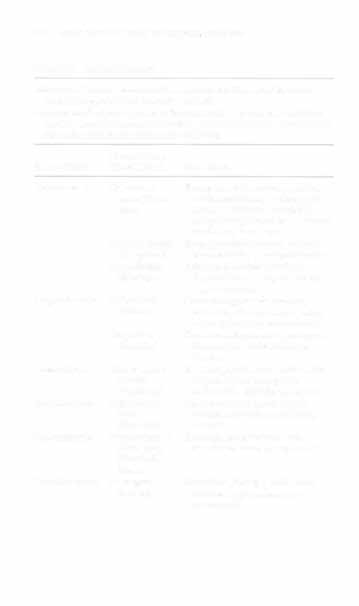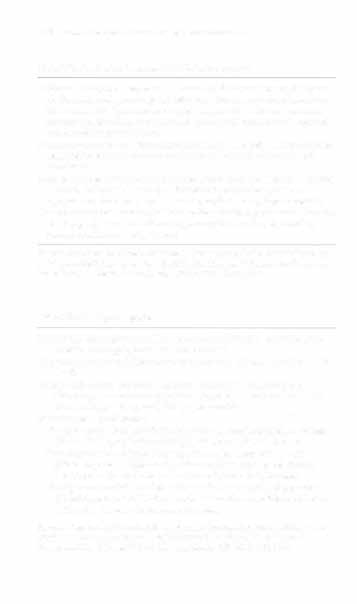i bc27f85be50b71b1 (265 page)
Read i bc27f85be50b71b1 Online
Authors: Unknown


APPENDIX IV: PHARMACOLOGIC AGENTS
845
Warfarin sodium (Couma
Indications: Long-term prophylaxis and
din), anisindione (Miratreatment of venous thrombosis, PEt atrial
don)
fibrillation, or with prosthe£ic heart valve.
Mechanism of action: Interferes with
synthesis of vitamin K-dependent clotting
facrors that decrease prothrombin.
General side effects: Bleeding from gastrointestinal, genitourinary, respiratory. or
other tracts; dyspnea; headache; chest or
abdominal pain; systemic cholesterol
microcmbolism (purple coe syndrome).
Additional side effects of anisindione are
hemorrhage and dermatitis.
DVf = deep vein lhrombosis; NQW MI = non-Q wave myocardial infarction; PE = pulmonaryembolism .
• Ardeparin sodium only.
Sources: Dam from Drug Facts and Comparisons 2000 (54th cd).
St. Louis: Wolrers
Kluwer, 2000; and Anticoagulant, Amipiarclet, and Thrombolytic Drugs. Ln RA Lehne
(ed),
Pharmacology for Nursing Care (4th cd). Philadelphia: Saunders, 200 I.
Table rv-S. Anticonvulsant Agents·
Indication: To decrease seizure activity.
Mechanism of action: Exact mechanism is unclear; however, electrical impulses
from the cerebral motor cortex are decreased in frequency and voltage.
General side effects: Headache, nausea, vomiting, dizziness, vertigo,
confusion, agitation, fatigue, visual hallucinations, diplopia, tremor,
hyperreflexia, hypo- or hypertension, arrhythmia, congestive heart failure,
edema, urinary frequency or retention.
Generic name (trade name): Carbamazepine (Atretol, Carbarrol, Epitol. Tegretol), clonazepam (Klonopin), clorazepare dipotassium (Gen-Xene, Clorazepate), diazepam (Diasrat, Valium), ethosuximide (Zarontin), ethoroin (Peganone), felbamate (Felbarol), gabapentin (Neurontin), lamorrigine (Lamjctal), magnesium sulfate, methsuximide (Celontin), Phensuximide (Milontin), phenytoin, primidone (Mysoline), tiagabine hydrochloride (Gabitril Filmtabs),
ropiramare (Topamax), valproic acid (Depacon, Depakene, Depakore).
"Consists of multiple drug categories, including barbiturates, hydanroins, succinimides,
and benzodiazepines.
Sources: Data from Drug Facrs and Comparisons 2000 (54th ed). Sr. Louis: Wolters
Klllwcr, 2000; and Drug Facrs and Comparisons 200 1 (55th ed). Sr. LOllis: Wolters
Klllwer, 200 I .

846
ACUTE CARE HANDBOOK FOR PHYSICAl THFRAI)ISTS
Table rV-6. Antiemetic Agents
Indications: Control symptoms of nausea and vomiting associated with
chemotherapy, radiation treatment, or both.
Mechanism of action: Depressive effects on central nervous system that can
result in decreased nausea and vomiting, particularly if these symptoms are
associated with anxiety during chemotherapy.
Generic Name
Family Name
(Trade Name)
Side Effecrs
Phenorhiazines
Chlorprom-
Extrapyramidal reactions, sedation,
azine (Thoratardive dyskinesia, pseudoparkinzine)
sonism, orthostatic hypotension,
arrhythmias, blurred vision, electrocardiographic changes
Prochlorperazine Extrapyramidal reactions, sedation,
(Compazinc)
blurred vision, pseudoparkinsonism
Promethazine
Sedation, drowsiness, confusion,
(Phenergan)
hypotension, nausea, df)' mouth,
agra n u locytosis
Butyrophenones
Haloperidol
Severe extrapyramidal reaction,
(Haldol)
tardive dyskinesia, blurred vision,
neuroleptic malignant syndrome
Droperidol
Drowsiness, hypotension, extrapyram
(Inapsine)
idal reaction, orthostatic hypotension
Cannabinoids
Tetrahydrocan-
Impaired psychomotor performance,
nabinol
altered sensory perception,
(marijuana)
tachycardia, paresthesia, tinnitus
Antihistamines
Diphenhydra-
Drowsiness, nausea, dry mouth,
mine
vertigo, palpitations, confusion,
(Ben.dryl)
headache
Corticosteroids
Dexamethasone
Insomnia, hypertension, edema,
(Decadron,
muscle weakness, hyperglycemia
Hexadrol,
Dexone)
Benzodiazepines Lorazepam
Drowsiness, lethargy, restlessness,
(Ativan)
transient hypotension, visual
disturbances




APPENDIX IV: PHARMACOLOGIC AGENTS
847
Generic Name
Family Name
(Trade Name)
Side Effects
Mccociopra
Resdcssness, anxiety, drowsiness, dizmide (Reglan)
ziness, extrapyramidal symptoms,
tardive dyskinesia, dystonic reactions, transiem hypertension
Other
T rimethobenza
Drowsiness, hypotension, diarrhea,
mide (Tigan)
hepatotoxicity
Sources: Data from C Ciccone (ed). Cancer Chemotherapy. Philadelphia: FA Davis,
1 996; D Moreau (ed). Nursing '96 Drug Handbook. Springhouse, PA: Springhouse,
1996; and LM Tierney, 5j McPhee, MA Papadakis (eds). Currenr Medical Diagnosis
and Trearment. New York: McCraw-Hili, 2000.
Table IV-7. Antihistamines
Indications: To decrease inflammation and bronchoconstriction associated
with hypersensitivity reactions, such as allergic rhinitis
Mechanism of action: Reduce or prevent the physiologic effects of histamine
by competing for histamine binding sites
General side effects: Drowsiness, dizziness, decreased coordination,
orthostatic hypotension, hypotension, hypertension, palpitations,
bradycardia, tachycardia, epigastric distress, urinary frequency, thickening
of bronchial secretions, dry mouth
Generic namc (trade name); Astemizole (Claritin), azatadine maleate (Opt imine), azelastine hydrochloride (Astelin), chlorpheniramine maleate (Aller
Chlor, Allergy, Chlo-Amine, Chlor-Pro, Chlor-Trimeton, ciemastine fumarate (Anti-hist 1, Tavist), dexchtorpheniramine maleate, diphenhydramine hydrochloride (AllerMax, Benadryl, Banophen, Diphenhist, Siladryl,
Tusstat), promethazine hydrochloride (Anergan, Phenergan)
Source: Data from Drug Facts and Comparisons 2000 (54th cd). St. Louis: Wolters
Kluwer, 2000.
